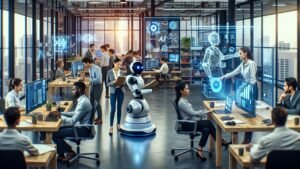AI in the workplace is no longer futuristic fluff—it’s today’s reality. Okay, folks, let’s be real. We’re not living in some sci‑fi movie, but let’s face it, sometimes it feels like we’re pretty darn close. The robots aren’t exactly walking among us (yet!), but their code-based cousins have well and truly infiltrated the workplace. We’re talking 2025 here, and AI isn’t just a buzzword anymore; it’s here to stay.
So, let’s dive in. Has AI made work better? Is it a shiny new tool or a ticking time bomb? Are we all doomed to be replaced by emotionless algorithms? And what’s with all the resistance I keep hearing about? Get ready, because we’re about to unpack the AI-powered workplace of today (well, tomorrow, technically!).
AI Everywhere You Look (And Probably Didn’t Even Notice)
First off: AI’s Ubiquity
- First off, let’s acknowledge the sheer ubiquity of AI. You might think it’s just in self-driving cars and humanoid robots, but it’s everywhere. Seriously.
Customer Service: Say Goodbye to Hold Music (Maybe!)
- AI-powered chatbots handle a massive chunk of inquiries, answer common questions, troubleshoot basics, and route complex issues to humans.
- 24/7 instant support sounds great, though chatbot experiences vary.
HR: The Algorithmic Applicant Tracker
- AI screens resumes and can conduct initial interviews.
- It can sift through hundreds or thousands of applications to find candidates who meet criteria.
- Debates continue: can reduce bias, or embed bias in the algorithms?
Marketing: Personalized Everything
- AI analyzes browsing, purchase, and social data to craft highly personalized campaigns.
- Expect more relevant ads, targeted content, and tailored recommendations.
- Creepy or effective? Both plausible.
Manufacturing: Robots on the Assembly Line (Duh!)
- AI makes robots on the line smarter, more adaptable, and capable of complex tasks.
- They learn, adjust to conditions, and collaborate with humans.
Finance: Detecting Fraud and Forecasting Markets
- AI speeds up fraud detection and can help predict trends.
- Automates tasks like portfolio management, though market guesses still carry uncertainty.
Healthcare: AI Doctors (Almost!)
- AI assists with disease detection from medical images and personalizes treatment Plans.
- Supports, rather than replaces, clinicians and procedures.
And these are just a few examples! From agriculture to education, AI is quietly (and sometimes not so quietly) transforming the way we work.
Has AI Made Work Better? Let’s Weigh It Out.
This is the million-dollar question. Has all this AI integration improved our working lives? The answer, unsurprisingly, is… it depends.
The Pro Side:
- Increased Efficiency: Let’s face it, AI can automate many repetitive and tedious tasks, freeing up human workers to focus on more creative, strategic, and engaging work. Who wouldn’t want to ditch the data entry and brainstorming sessions?
- Improved Accuracy: AI algorithms can often perform tasks with greater accuracy than humans, reducing errors and improving overall quality. This is especially important in fields like healthcare and finance, where even small mistakes can have serious consequences.
- Enhanced Productivity: By automating tasks and improving accuracy, AI can help businesses become more productive and competitive. This can lead to higher profits, better products, and more jobs (theoretically!).
- Better Decision-Making: AI can analyze vast amounts of data to identify patterns and insights that humans might miss, leading to better informed and more strategic decision-making. Think of it as having a super-powered research assistant constantly crunching numbers.
- Safer Work Environments: In hazardous industries like mining and construction, AI-powered robots can perform dangerous tasks, reducing the risk of injury or death for human workers.
The Con Side:
- Job Displacement: This is the big one, the elephant in the room. As AI automates more tasks, there’s a genuine concern that it will lead to widespread job losses. While some argue that AI will create new jobs, there’s no guarantee that these new jobs will be accessible to everyone who loses their old ones.
- The Skills Gap: Even if AI does create new jobs, many of these jobs will require advanced skills in areas like data science, AI development, and machine learning. This could leave many workers behind, particularly those who lack the resources to acquire these new skills.
- Algorithmic Bias: As mentioned earlier, AI algorithms are only as good as the data they’re trained on. If that data contains biases (which it often does), the algorithm will perpetuate those biases, leading to unfair or discriminatory outcomes. This is a grave concern in areas like hiring and loan applications.
- Loss of Human Connection: As AI takes over an increasing number of tasks, there’s a risk of losing the human connection and collaboration that are so important to a positive work environment. Imagine a workplace where everyone’s just interacting with machines all day long. Doesn’t sound too appealing.
- Increased Stress and Anxiety: The constant pressure to adapt to new technologies and the fear of being replaced by AI can lead to increased stress and anxiety for workers. The feeling of constantly needing to upskill and prove your value is a very real source of stress.
Resistance: The Human Side of AI Adoption. We Feel Ya.
It’s no surprise that there’s resistance to AI adoption in the workplace. Change is hard, and when that change involves the potential loss of your livelihood, it’s understandable that people are wary.
This resistance can manifest in several ways:
- Open Opposition: Some workers may actively resist AI adoption by refusing to use new technologies or even sabotaging them.
- Passive Resistance: Others may passively resist AI by slowing down their work, making mistakes, or simply disengaging from their jobs.
- Anxiety and Stress: As mentioned earlier, the fear of being replaced by AI can lead to increased anxiety and stress, which can negatively impact productivity and morale.
- Lack of Trust: Workers may not trust AI algorithms to make fair or accurate decisions, especially if they don’t understand how those algorithms work.
- Concerns about Ethics: Some workers may have ethical concerns about the use of AI in the workplace, particularly in areas like privacy and data security.
So, How Do We Navigate This AI-powered future?
Okay, so AI is here to stay. Resisting it outright isn’t precisely a viable strategy. But surrendering to a robot overlord future isn’t exactly ideal either. So, what’s the solution? Embracing it… cautiously.
Here’s my (slightly optimistic) take:
- Focus on Human Skills: While AI can automate many tasks, it can’t replace the uniquely human skills like creativity, critical thinking, empathy, and communication. We need to focus on developing and honing these skills to remain relevant in the AI-powered workplace.
- Embrace Lifelong Learning: The skills that are in demand today may not be in demand tomorrow. We need to embrace a mindset of lifelong learning and be willing to adapt to new technologies and acquire new skills throughout our careers.
- Demand Transparency and Accountability: We need to demand transparency and accountability from companies deploying AI in the workplace. We need to understand how these algorithms work, how they’re being used, and what safeguards are in place to prevent bias and discrimination.
- Advocate for Fair Labor Practices: We need to advocate for fair labor practices that protect workers from displacement and ensure that they are fairly compensated for their work. This includes things like universal basic income, retraining programs, and stronger labor protections.
- Find the “Human-Plus-AI” Sweet Spot: The best approach isn’t to replace humans with AI completely, but to find ways for humans and AI to work together synergistically. Think of AI as a powerful tool that can augment human capabilities, rather than a replacement for them.
The Takeaway: It’s Up to Us.
Ultimately, the future of work in the age of AI is up to us. We can choose to be passive victims of technological change, or we can actively shape that change to create a more just, equitable, and fulfilling future for everyone. It’s going to require effort, adaptation, and a whole lot of conversations like this one.
So, what are your thoughts? Is AI a blessing or a curse in the workplace? What are your biggest concerns? Let’s talk about it in the comments below! Because let’s face it, we’re all in this crazy robot-filled future together.

